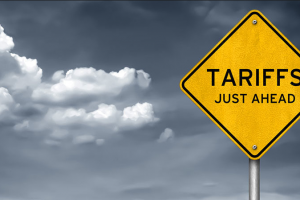US President Donald Trump has imposed a tariff on Chinese imported good. This has sparked speculation of a potential trade war. Firstly, a tariff is defined as a tax enforced on imports. Trump has imposed a 25 per cent tariff tax on US$34 billion Chinese goods into the US starting on July 6. Trump has also threatened additional tariffs at a rate of 10 per cent if China goes ahead with new tariffs which they have proposed to put on US commodities. As an investor, it is important to understand the effects of this potential trade war. These are the effects of Trump’s tariffs on US businesses, American consumers, and Australia.
Effect on US businesses
The US has listed 1100 Chinese goods to impose a 25% tariff on.
China has retaliated and will place a 25 per cent on tariffs on US imports worth $34 billion a year. This includes soybeans, seafood, crude oil, and electrical vehicles.
US companies who use imported Chinese products will pay more for imported Chinese parts or they will need to pay more to use domestic materials. These tariffs will make manufacturing costs more expensive to businesses. So either they absorb these costs which reduce profit margins, or they pass it onto the consumer.
Farming equipment – These Chinese import tariffs will affect farming machinery making it more expensive for the American farmer to operate. Farmers will be forced to absorb these increased costs because the industry is already very competitive.
Motor vehicles – Motor Vehicle companies use steel and aluminium materials from China which means these tariffs could make vehicles more expensive to manufacturer. This could drive up the cost of motor vehicles.
Health care equipment – Tariffs were imposed on health care equipment from China such as CT scanners. Some American companies purchase inventory from China so their costs may increase.
Pork Farmers -Tariffs will be put on pork products from the US to China. This will affect pork farmers drastically as China is the third largest market for US pork exports.
Beer Makers – Due to the increased cost of Aluminium from the tariffs, American beer makers will find the manufacturing of their cans costing more. They can either absorb these costs or pass it on to their consumers.
Soybeans – Soybeans are expected to increase in price after China applied tariffs on US items. This will directly affect soybean farmers. American farmers may find demand for their goods decreasing as Chinese consumers find cheaper products from other countries.
Wine industry – US wines will be hit a 15% tax in China, this will be make US wines more expensive to the Chinese consumer and could lower the demand of American wine. However, it could increase the demand of the wine from other countries.
Effect on American consumers
These tariffs will slow down consumer spending. This is because these higher costs faced by businesses may be passed on to consumers, making items more expensive. This can mean reduced economic growth, loss of jobs and higher cost for families. These tariffs may in effort offset the tax cuts provided to tax payers.
Aluminium and steel Industries – Jobs may be lost in industries involving imported steel and aluminium due to the higher operating cost from the tariffs imposed on them. Large redundancies means less purchasing power of American consumers which can lead to slowing of economic growth.
Pork Prices – Price of pork will go up as the Chinese will buy less due to the tariff. So pork farmers will produce less which leads to an increase of prices for pork products to Americans.
Effect on Australia
Australia was exempted from the 25 per cent tariff on steel and 10 per cent tariff on aluminium. This would not have impacted Australia significantly as Australia is not a large exporter of steel or aluminium. However, all trade wars have a knock-on effect. Even though Australian may not be imposed a tariff, the disposable income of Chinese consumers may be reduced from higher cost of consumer staples from the tariffs of US imports. This may mean they can spend less money on consumer discretionary products such as wine and other Australian products.
Lauren Hua is a private client adviser at Fairmont Equities.
Sign up to our newsletter. It comes out every week and its free! You can leave your email with us via the form on the right-hand side of this page.
Otherwise you can email us at mail@fairmontequities.com
Disclaimer: The information in this article is general advice only. Read our full disclaimer HERE.
Like this article? Share it now on Facebook and Twitter!

